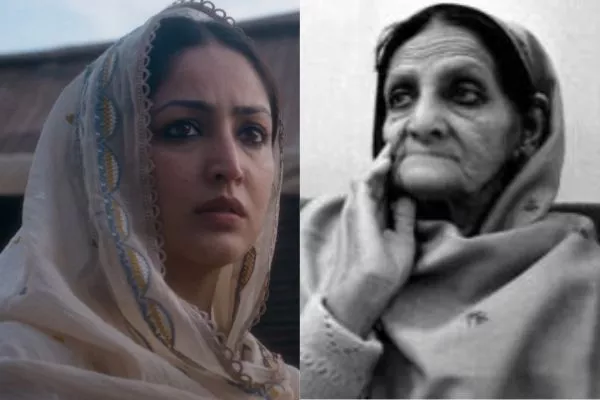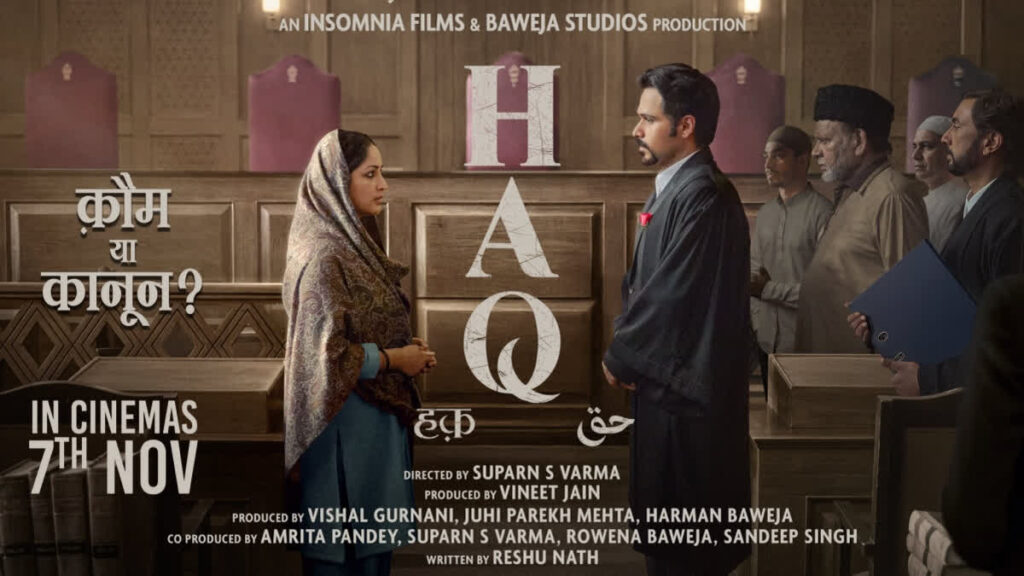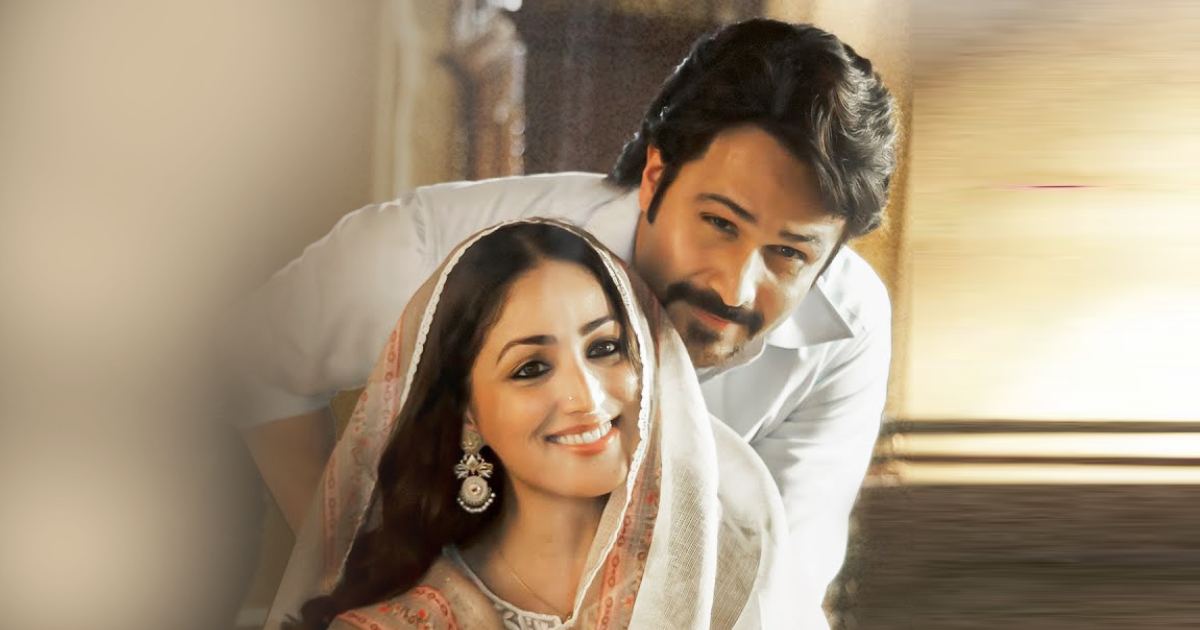Director Suparn Verma does an excellent job in making sure that the movie doesn’t end up demonizing the Muslim community. It’s more about men twisting laws and using religion as an excuse to have their way irrespective of the faith. Yami Gautam as Shazia Bano is excellent as is Emraan Hashmi who has the trickier part. Both the writing and Emraan make sure that the husband doesn’t slip into a caricature
Starcast: Yami Gautam, Emraan Hashmi, Danish Hussain, Sheeba Chadda, Vartika Singh and others
Genre: Drama
Director: Suparn Verma
Writer: Reshu Nath
Based on: Bharat Ki Beti novel Jigna Vora
Producers: Harman Baweja, Vishal Gurnani and Juhi Parekh Mehta
Production Companies: Baweja Studios, Insomnia Films and Junglee Pictures
Cinematography: Pratham Mehta
Music: Vishal Mishra
Running time: 2 hours and 16 minutes
The landmark Supreme court judgement of Sha Bano upholding her rights of maintenance is a very significant one even today. Of course, the entire scenario took a political turn as well making it a matter of national debate; but beyond that it become a milestone case for women’s rights in this case an Indian Muslim. It raised questions about gender equality and protecting women’s rights. Haq directed by Suparn Verma and written by Reshu Nath successfully brings alive the long and arduous battle of Sha Bano with Yami Gautam playing Shazia. Emraan Hashmi is Shazia’s husband turned adversary Abbas.


The story of Haq in simple terms focuses on the emotional turmoil faced by Shazia (an excellent Yami Gautam). Everything seems perfect with a loving husband and children, but her life goes upside down with Abbas (Emraan Hashmi) doing second marriage. Shazia as expected is very angry with her husband’s actions. She tries to make peace with the situation but that becomes difficult as Abbas gives little to no attention for Shazia. She takes the decision of going back to parent’s house. The situation takes a major dramatic turn when Abbas cuts of all ties starting with the children. He stops giving the maintenance money and then comes the divorce with just the three words Talaq. This is the story in brief.
A strong aspect of Haq is the gradual revealing of different layers. Suparn Verma first establishes the happy moments of their married life. Abbas isn’t painted as a complete jerk. There is a visible romantic side in the initial scenes like the portion involving Shazia’s wish of wanting a rose garden. Gradually though things start to change after two children. He spends more time in the office giving not much time for her and children. Even when Shazia calls to talk about important matters Abbas asks her to not disturb and handle things on her own. The seeds of a scarred marriage start from there and take a full shape with the arrival of Vartika Singh’s Saira.
As a result of this layered writing the transformation of Abbas doesn’t come as jerky. The battle of Shazia has also been depicted well both in the terms of direction and Yami’s solid act. The role has the perfect mixture of vulnerability and a mother’s fighting spirit. A specific mention must be made of the emotional scenes where Shazia questions her husband. The dialogues are power packed, and the performances of both the actors make it even better.
Emraan Hashmi though has a trickier role as already mentioned. Abbas could have easily slipped into an over-the-top villain but Suparn Verma along with Reshu Nath give a psychologist insight into a man trapped in a sense of entitlement. Someone who refuses to see his wrong doings. There is also a sense of tragedy to Abba’s downfall. This is wonderfully captured in the moment where the one of sons doesn’t even make eye contact with the father. There is a palpable pain in the way Abbas talks about this to Shazia before the landmark Judgement. Emraan does an excellent job in capturing the little nuances.
The biggest victory of Haq though is that it never demonizes the Muslim community. The battle of Shazia Bano has a universal touch not restricted to a particular religion. Its more about men reinterpreting laws as per their convenience and using religion as a tool to hide behind their regressive thought process.
The dialogues are also power packed. The best of the lot involves a conversation between Shazia and Abba’s second wife. Shazia gives an important message on the need for respect in a relationship and how that is sometimes equally important. Vartika Singh as the second wife has a dignified presence and thankfully the movie doesn’t turn into two women fighting over one man. There is a wonderful moment involving the two when Saria places a basket of vegetables for cooking. This happens after Shazia starts facing social ostracization. Similarly in another moment she strongly says to Abbas about Shazia being right which obviously doesn’t go down well with the husband.
Danish Hussain as the supportive father is also wonderful to watch. The way he boosts Shazia’ ‘s spirit when the chips are absolutely down is a treat to watch. Through him the movie gives a progressive Muslim man. Sheeba Chadda as Shazia’s lawyer is excellent too in the courtroom scenes. Assem Hattangady as Faraz Sayeed is fine as well. The way he stands with Sheeba Chadda’s Bela Jain in spite of certain misgivings is nice to watch.
There isn’t much place for music in a movie like Haq but an important romantic number between Emraan and Yami has been smartly integrated. The song Qubool has a lovely melody establishing how happy they were. Pratham Mehta’s cinematography is successful in taking back the viewers to those times. The atmospherics have a lived-in feel.


As far the flaws the final courtroom arguments have a rushed feel. Also the heavy use of Urdu in some sequences can be hugely distracting.
Final word: Haq is a very relevant tale with the issues being the same even today. On a side note, its great to see two women centric narratives the Girlfriend and Haq in the same week.
